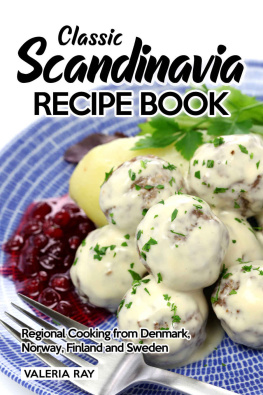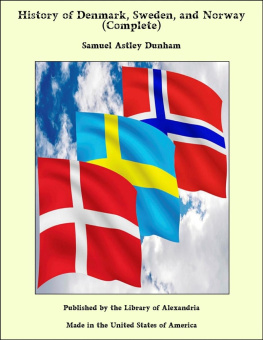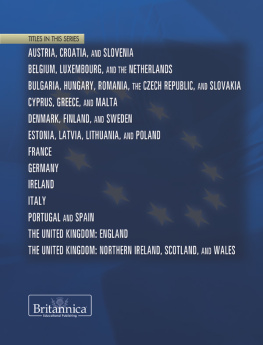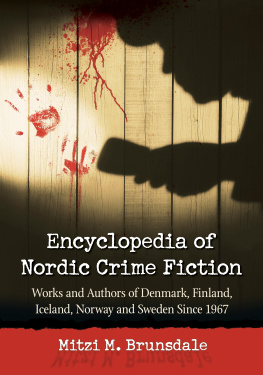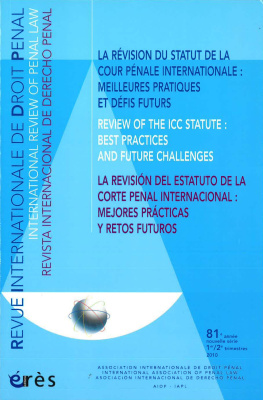First published 2003 by Transaction Publishers
Published 2017 by Routledge
2 Park Square, Milton Park, Abingdon, Oxon OX14 4RN
711 Third Avenue, New York, NY 10017, USA
Routledge is an imprint of the Taylor & Francis Group, an informa business
All rights reserved. No part of this book may be reprinted or reproduced or utilised in any form or by any electronic, mechanical, or other means, now known or hereafter invented, including photocopying and recording, or in any information storage or retrieval system, without permission in writing from the publishers.
Notice:
Product or corporate names may be trademarks or registered trademarks, and are used only for identification and explanation without intent to infringe.
Library of Congress Catalog Number: 2003053137
Library of Congress Cataloging-in-Publication Data
Bondeson, Ulla, 1937
Nordic moral climates : value continuities and discontinuities in
Denmark, Finland, Norway, and Sweden / Ulla V. Bondeson.
p. cm.
Includes bibliographical references and index.
ISBN 0-7658-0203-1 (cloth : alk. paper)
1. ScandinaviaMoral conditions. 2. ValuesScandinavia.
I. Title.
HN540.Z9M63 2003
303.3'72'0948dc21
2003053137
ISBN 13: 978-1-41-280676-3 (pbk)
4.1. Equality before the Law in the Nordic Countries Individually (A5; %)
4.2. Confidence in Institutions in the Nordic Countries Totally (A25; %)
4.3. Trust in Other People for the Nordic Countries Individually (A41; %)
4.4. Institutions Upholding Morality in the Nordic Countries Individually (A9; %)
5.1. Different Scales of Moral Justification in the Nordic Countries Individually (A11; M)
5.2. Seriousness of Different Types of Crime (A12; %)
6.1. Self-Reported Crime in the Nordic Countries Individually (A38; %)
6.2. Victim of Any Crime over the Past Year (A39; %)
6.3. Fear of Assault in the Street in the Nordic Countries Individually (A40; %)
7.1. Reasons for Legal Obedience in the Nordic Countries Individually (A7; %)
7.2. Legal Obedience versus Conscience in the Nordic Countries Individually (A8; %)
7.3. Purpose of Imprisonment (A15; %)
7.4. Severity of Punishment (A13; %)
7.5. Acceptance of the Death Penalty in the Nordic Countries Individually (A20; %)
7.6. Acceptance of Alternatives to Imprisonment (A17; %)
7.7. Consequences of Punishment (A16; M)
8.1. Attitudes to Immigration in the Nordic Countries Individually (A46; %)
8.2. Attitudes to the Unemployed in the Nordic Countries Individually (A48; %)
8.3. Attitudes to People in Poverty in the Nordic Countries Individually (A47; %)
8.4. Attitudes towards Work in the Nordic Countries Individually (A49; %)
8.5. Preferred Family Type in the Nordic Countries Individually (A6; %)
8.6. Levels of Trust between the Young and the Old Generations in the Nordic Countries Individually (A36; M)
9.1. Support of Exclusively Public Running of Institutions in the Nordic Countries Individually (A27; %)
9.2. Financial Support for National and International Relief Organizations in the Nordic Countries Individually (A50; %)
9.3. Geographical Attachment in the Nordic Countries Individually (A52; %) - First Priority
10.1. Life Satisfaction in the Nordic Countries Individually (A31; % Scale 1-10)
10.2. Self-Determination in the Nordic Countries Individually (A28; % Scale 1-10)
10.3. Religious Belief in (a) Personal God, and if not, (b) A Divine Power, in the Nordic Countries Individually and Totally (A43; %)
10.4. Absolute Guidelines for Good and Evil in the Nordic Countries Individually (A42; %)
10.5. The Basic Nature of Man in the Nordic Countries Individually (A44; %)
12.1. Decline in the Importance of Work in Attitude to the Level of Punishment
12.2. More Emphasis on the Development of the Individual by Level of Punishment
12.3. More Emphasis on Family Life by Level of Punishment
12.4. Attitude to Greater Respect for Authorities by Attitude to Level of Punishment
12.5. Having Signed a Petition by Attitude to Level of Punishment
12.6. Having Joined in Boycotts by Attitude to Level of Punishment
12.7. Having Attended Lawful Demonstration by Attitude to Level of Punishment
12.8. Sympathy with Womens Movements by Attitude to Level of Punishment
12.9. Sympathy with Disarmament Movements by Attitude to Level of Punishment
12.10. Sympathy with Anti-nuclear Movements by Attitude to Level of Punishment
12.11. Development of the Individual by Aggravated Drunk Driving
13.1. Confidence in Institutions in the Individual Countries: Parliament (% a great deal or quite a lot)
13.2. Confidence in Institutions in the Individual Countries: The Press (% a great deal or quite a lot)
13.3. Confidence in Institutions in the Individual Countries: The Police (% a great deal or quite a lot)
13.4. Confidence in Institutions in the Individual Countries: The Legal System (% a great deal or quite a lot)
13.5. Confidence in Institutions in the Individual Countries: The Church (% a great deal or quite a lot)
13.6. Confidence in Institutions in the Individual Countries: The Armed Forces (% a great deal or quite a lot)
13.7. Moral Justification in the Individual Countries: Avoiding a Fare on Public Transport (% never justified)
13.8. Moral Justification in the Individual Countries: Claiming State Benefits Which You are Not Entitled to (% never justified)
13.9. Moral Justification in the Individual Countries: Someone Accepting a Bribe in the Course of Their Work (% never justified)
13.10. Moral Justification in the Individual Countries: A Man or a Woman Having Homosexual Relationships (% never justified)
13.11. Moral Justification in the Individual Countries: A Person Committing Suicide (% never justified)
13.12. Moral Justification in the Individual Countries: A Woman Having an Abortion (% never justified)
13.13. A Doctor Terminating the Life of an Incurably Ill Patient in the Individual Countries (% never justified)
13.14. Guidelines for Good and Evil in the Individual Countries (% yes)
13.15. Life Satisfaction in the Individual Countries (% satisfied, points 7-10 on the scale)
13.16. Self-Determination in the Individual Countries (% a great deal, points 7-10 on the scale)
13.17. Left-Right Self-Placement in the Individual Countries (% right, points 7-10 on the scale)
13.18. Attachment to City/Locality I live In (%) in the Individual Countries
13.19. Life Satisfaction: Denmark (% very satisfied.) Source: Euro-barometer Trends 1973-1994
13.20. Confidence in the Police: Norway (% a great deal and quite a lot) (MMI)
13.21. Confidence in the Courts: Norway (% a great deal and quite a lot) (MMI)
13.22. Confidence in the Educational System: Norway (% a great deal and quite a lot) (MMI)
13.23. Confidence in the Health and Social Services System: Norway (% a great deal and quite a lot) (MMI)


